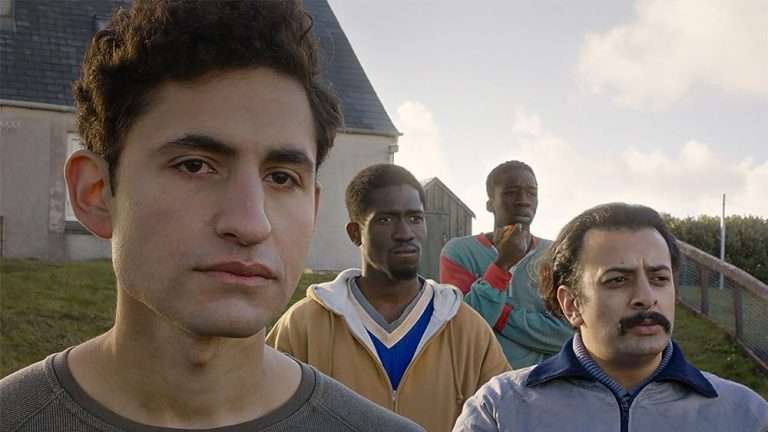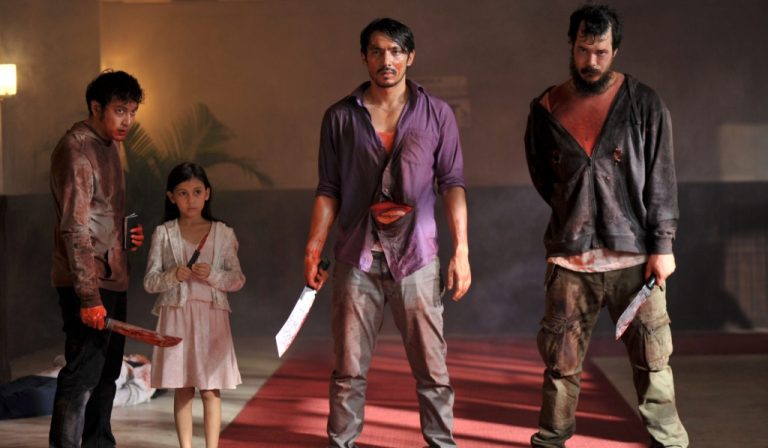American Auto the Heir to the Office: There’s no question among a certain generation (myself included) that The Office was the defining workplace comedy of its era. Despite some of its plot implausibilities and the fact that a Michael Scott would never last long in a real-life corporation (ditto Dwight, Creed, and Meredith), the show’s eccentricities were juxtaposed with a realism about the ups and uncertainties of corporate life that has rarely been matched. The murderer’s row of talent in The Office’s writer’s room went on to produce many television projects (Russian Doll, Mindy Project, Parks and Recreation, Brooklyn Nine-Nine, The Premise, The Good Place, Space Force, etc.) and many of them have been great and/or commercially successful TV shows. But for capturing the delicate satire that the American version of The Office perfected, I’d argue that the heir apparent is Justin Spitzer. In particular, his latest show, American Auto (2021 – ), fits the bill.
First, reviewing some of the contenders for The Office: The Next Generation, the most popular choice among The Office fans for the next best thing is Parks and Recreation. The show, created by The Office creator Greg Daniels and one of his three original writers Michael Schur, was initially intended as a spin-off for Rashida Jones’ character Karen that so much of the DNA of the two shows is the same.
After a first season that’s universally considered to be awkward, Parks and Recreation diverged significantly through its more Pollyanish vision. The show didn’t just seek to find moments of humanity within Leslie Knope and her ragtag team of government bureaucrats. Instead, it glorified them as a gang of best friends and gave them all happy endings. This was the show for you if you like your happy endings too syrupy and sweet. Still, the show started losing its verisimilitude factor the farther it went along, from an over-enthusiastic office pariah and a nurse who had a complaint about a pit.
In addition to that, Mindy Kaling created the Mindy Project, which ran from 2012 to 2017 and drew on her mother’s life as an OBGYN. While the series had its fair share of office politics, it was mainly about Kaling’s author avatar wrestling with whether she could get married later in life. Michael Schur also created Brooklyn Nine-Nine (2013-2021), which was driven by the goofy antics of star Andy Samberg and took on the style of an anarchic comedy. We also have Greg Daniels’ short-lived Space Force (2020-2022), which boasted Steve Carell as its star, but it was a high-wire act from the start with its odd marriage of political satire and workplace comedy.
Enter Justin Spitzer. Although sitcom writing is a group process, Spitzer is credited with several of the most dramatic episodes of The Office in terms of the biggest threats to the in-universe status quo. Among them: “Did I Stutter,” in which Michael has to be an actual boss to a disobedient subordinate; “Shareholding Meeting,” in which Oscar takes the company to the task; “Angry Andy,” in which Andy quits the company; and “The Michael Scott Paper Company,” in which three workers set out on their own. These episodes explore real stakes in which characters can gain or lose everything.
In his first solo series as showrunner, Superstore (2015-2021), Spitzer sets the show at a big box store (akin to Walmart or Target) in Saint Louis. On occasion, the show would successfully delve into hot-button issues such as undocumented immigrants, surrogacy, the stigma of divorce, and the difficulties of dating a subordinate. For the most part, however, the show’s comedic gold was how the characters bickered and made any situation more complicated than it needed for anyone unlucky enough to take on the purgatory of middle management.
The managerial staff was a pair of corporate buffoons who suffered from too little empathy (Dena, played by Lauren Ash) and too much (Glenn, played by Mark McKinney). The show’s equivalent of Jim was a charming law school dropout (Jonah, played by Ben Feldman) who stuck around for an astounding six years. This might possibly be a world record for how long any college-educated male had ever stuck around a big box store without any advancement.
In other words, the longer you thought about anything in Superstore, the less sense anything made. The show attempted to replicate the found family trope of The Office, but there are rarely company-wide meetings (rarely with a workforce that big), and the turnover is too high for such bonds to form.
American Auto aims for the same class commentary by showing the various stages of aloofness at the top of the executive heap. The show takes place at the headquarters of a motor corporation in Detroit as Ana Gasteyer plays an outside hire for the company CEO, who’s ironically never driven a car. Our audience surrogates are put-upon communications officer Sadie (Harriet Dyer) and the blue-collar worker Jack (Tye White), who got promoted upwards through sheer dumb luck. As the series progresses, Jack and Sadie show signs of being more comfortable in their first-class digs than they do being among the common people.
Rather than poke fun at rich and powerful people for simply being rich and powerful (the method of present-day satire like The Menu or Glass Onion), American Auto presents rich people as both being victims of their own detachment but also a product of an ecosystem of enhanced scrutiny and increasing demands on the shareholders. One of the main characters (Wesley, Jon Barinholtz), for example, is the descendant of the company’s founder. He truly exemplifies the idle rich—as if the 1st class passengers of the Titanic were transported 110 years to the present. But part of the joke is that he’s simply a product of an upbringing that kept him from developing social intelligence.
American Auto is a great workplace comedy with diverse characters that are unified (rather than being defined or divided by) despite differences in race or sexual orientation (another plus for viewers weary of identity politics). However, this show is thematically about the difficulty of maintaining an image. It has a practical purpose in the show’s infrastructure as the company’s value to the public and shareholders depends on this. Still, it also manifests itself in ironies great (lawyers urging the CEO to do nothing in the wake of a crisis because that’s better than making any decision legally) and small (a CEO of a car company who doesn’t drive).
The episodes involve plots illustrating the futility of attempting to appease a fickle public (some conservatives might call it the ‘woke mob’). In one episode, the CEO answers a Somalian 8th grader with good wishes back to her home country. Her comment is interpreted by Somalia’s political enemy and principal company supplier as taking their side in an international dispute. In another episode, complications arise while attempting to reshoot a commercial because the CEO has been called out for not being an active enough LGBTQ ally. It ends up opening the door to so many other possible offenses that it isn’t worth the effort.
Since comedies are often about human stupidity, the rich and aloof characters don’t get let off the hook. However, the satire does not hold back punches from the milieu in which they are pulled.
Both seasons of American Auto (2021 – ) are currently available at Peacock.





